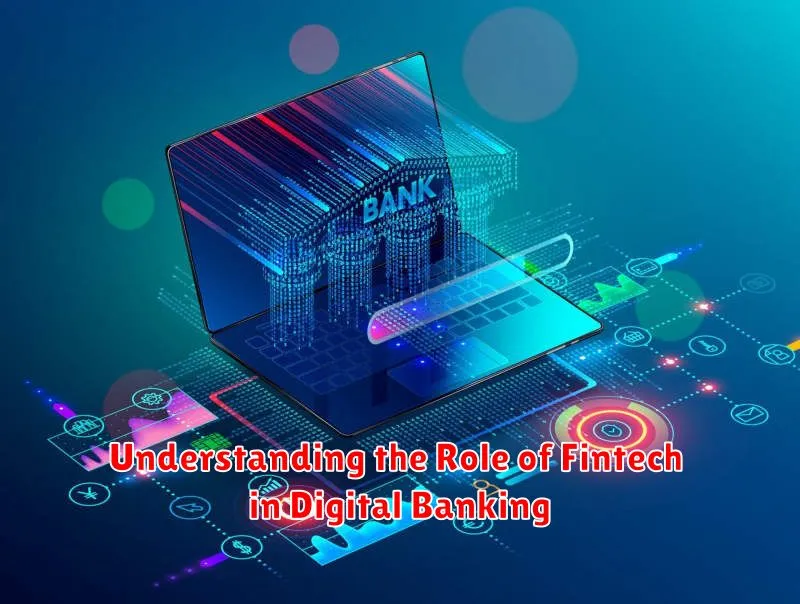The financial technology sector, better known as Fintech, is rapidly transforming the landscape of digital banking. This dynamic interplay is revolutionizing how we manage finances, conduct transactions, and interact with financial institutions. Understanding the role of Fintech in digital banking is crucial for navigating this evolving financial ecosystem. This article will explore the profound impact of Fintech on digital banking, highlighting key innovations, benefits, and challenges.
From mobile payments and robo-advisors to blockchain technology and open banking, Fintech is driving innovation across all facets of digital banking. This article will delve into the specific ways Fintech is reshaping digital banking, examining its influence on customer experience, operational efficiency, and financial inclusion. By understanding the role of Fintech, we can better appreciate its potential to create a more inclusive, efficient, and secure digital banking future.
Defining Fintech in Banking
Fintech, short for financial technology, represents the convergence of finance and technology. It encompasses a broad range of innovations reshaping how financial services are delivered and consumed. Within the banking sector, fintech signifies the integration of technology to enhance or automate financial services and processes.
This includes areas like mobile banking, online lending platforms, robo-advisors for investment management, and blockchain-based solutions for secure transactions. Essentially, fintech in banking aims to offer more efficient, accessible, and customer-centric financial solutions.
How Fintech Enhances User Experience
Fintech companies prioritize user experience by leveraging technology to streamline and simplify financial processes. This results in a more intuitive and efficient interaction for users.
Personalization is a key aspect. Fintech apps often employ data analytics to understand user behavior and offer tailored financial products and services. This creates a more relevant and engaging experience.
Accessibility is also significantly improved. Fintech solutions often bypass traditional banking infrastructure, making financial services available to a wider audience, especially those underserved by conventional banking.
Features like real-time notifications, 24/7 account access, and simplified mobile payments contribute to a more convenient and user-friendly experience overall. This empowers users with greater control and transparency over their finances.
Innovative Payment Solutions

Fintech has revolutionized payment processing, offering faster, more secure, and cost-effective solutions. Traditional methods are being replaced by innovative alternatives like mobile wallets, peer-to-peer (P2P) transfers, and real-time payment systems. These technologies leverage the power of mobile devices and internet connectivity to facilitate seamless transactions.
Mobile wallets, such as Apple Pay and Google Pay, enable contactless payments using near-field communication (NFC) technology. P2P platforms like Venmo and Zelle allow for quick money transfers between individuals. Real-time payment systems enable instant fund transfers, eliminating delays associated with traditional banking systems.
AI-Driven Financial Services
Artificial intelligence (AI) is rapidly transforming financial services, enabling more efficient and personalized experiences for customers. AI algorithms power a range of applications, from fraud detection and risk assessment to personalized financial advice and automated customer service.
Algorithmic trading uses AI to analyze market data and execute trades at optimal prices, while robo-advisors provide automated portfolio management based on individual risk tolerance and investment goals. AI-powered chatbots are increasingly used to handle customer inquiries, freeing up human agents to address more complex issues.
These advances are not only improving the efficiency and effectiveness of financial institutions but are also contributing to a more seamless and customized customer experience.
Fintech and Financial Inclusion
Fintech plays a crucial role in promoting financial inclusion by extending financial services to underserved populations. Traditionally, access to banking services has been limited by geographical location, income levels, and other socioeconomic factors. Fintech companies leverage technology to overcome these barriers and provide affordable and accessible financial solutions.
Mobile banking, digital lending platforms, and mobile money services are some examples of how fintech empowers individuals and businesses previously excluded from the formal financial system. These innovations offer convenient and cost-effective alternatives to traditional banking, facilitating greater participation in the economy.
Collaboration with Traditional Banks
Fintech companies are not always in competition with traditional banks. In fact, a significant amount of collaboration occurs between the two. Fintechs often possess technological expertise and agility that banks may lack.
By partnering, banks can leverage these strengths to improve their digital offerings and customer experience. This can involve integrating fintech software solutions into existing banking systems, creating new products jointly, or leveraging fintech expertise in areas like cybersecurity and data analytics.
This collaborative approach allows both entities to benefit from each other’s strengths, driving innovation and serving customers more effectively.
Cybersecurity in Fintech Solutions
Security is paramount in the fintech landscape. Fintech solutions handle sensitive financial data, making them prime targets for cyberattacks. Therefore, robust cybersecurity measures are crucial for maintaining user trust and the integrity of the financial system.
Key cybersecurity considerations include data encryption, multi-factor authentication, and regular security audits. Implementing these measures helps protect against fraud, data breaches, and other cyber threats.
Regulatory compliance also plays a vital role. Fintech companies must adhere to strict regulations like GDPR, PCI DSS, and other regional requirements to ensure data protection and operational security.
Investment and Wealth Management Tools
Fintech has significantly impacted investment and wealth management, offering innovative tools and platforms for both individual and institutional investors. Robo-advisors automate portfolio management based on risk tolerance and financial goals, providing a low-cost alternative to traditional advisors.
Micro-investing apps enable users to invest small amounts of money, making investing accessible to a wider audience. Furthermore, digital platforms offer access to a broader range of investment products, including fractional shares and alternative investments, previously unavailable to many.
These tools contribute to greater transparency and efficiency in investment management, empowering users with more control and insight into their financial portfolios.
Challenges Facing Fintech Companies
Fintech companies, while disrupting traditional financial services, face numerous hurdles.
Regulation remains a significant challenge. Navigating the complex and evolving regulatory landscape across different jurisdictions requires substantial resources and expertise.
Cybersecurity is paramount. Protecting sensitive user data and financial transactions from increasingly sophisticated cyber threats is a continuous battle.
Competition is fierce. Not only must fintechs contend with established financial institutions, but they also face pressure from other emerging fintech players in a rapidly evolving market.
The Future Growth of Fintech

The future of fintech is poised for continued expansion, driven by evolving consumer demands and technological advancements. Key areas of growth include embedded finance, where financial services are integrated into non-financial platforms, and the increasing prevalence of decentralized finance (DeFi).
Artificial intelligence and machine learning will play crucial roles in automating processes, enhancing security measures, and personalizing financial services. Furthermore, the expansion into underserved markets, particularly in developing economies, presents a significant opportunity for growth and financial inclusion.
Regulations will continue to adapt to this evolving landscape, shaping the direction of fintech innovation and ensuring consumer protection. The future will likely see greater convergence between traditional financial institutions and fintech companies, fostering a more integrated and dynamic financial ecosystem.

